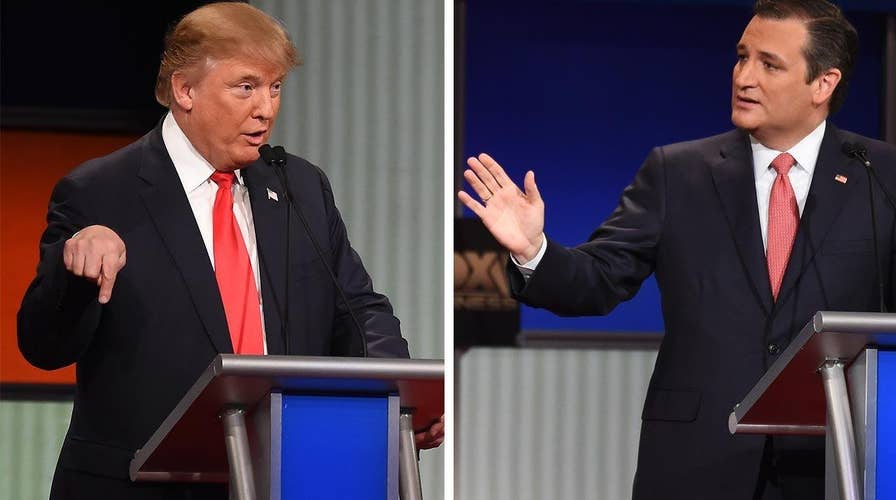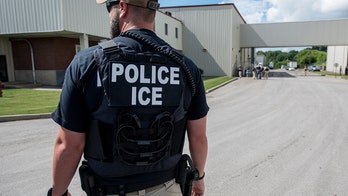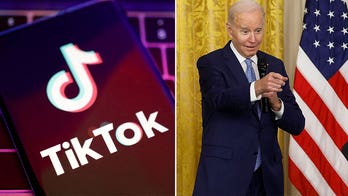Ted Cruz goes toe-to-toe with Donald Trump on citizenship
Chris Stirewalt and Howie Kurtz rate the first GOP debate of 2016
NORTH CHARLESTON, S.C. – The détente between Donald Trump and Ted Cruz came to a raucous end Thursday night on the unlikely issue of the senator’s Canadian birth.
And Marco Rubio vs. Chris Christie was the undercard.
Cruz was the top target in the Fox Business debate, which reflected his surge in Iowa. And the Texas senator made a tactical decision—his team felt he had no choice—to hit back against both the billionaire who has dominated this campaign and The New York Times for good measure.
Prodded by moderators Neil Cavuto and Maria Bartiromo, Cruz said that “my friend Donald” had once dismissed the “birther issue,” since Cruz was born to an American mother and is said by most legal experts to be eligible for the presidency. Only his poll numbers have changed, Cruz said. Trump candidly confirmed this moments later, saying, “Because now he’s doing a little better.”
Then Cruz tried to defuse the controversy with levity, saying that some scholars believe you need two parents born in America, and he wouldn’t make an issue of Trump’s mom being born in Scotland.
More barbed humor: Trump said that liberal, Hillary-loving Harvard prof Lawrence Tribe supported the birther theory, and that could mean a Democratic lawsuit if The Donald picked Ted as his vice president.
Cruz deftly countered that he’d pick Trump as his running mate, and if Trump was right, he’d quickly get the top job.
Bottom line: Cruz fought Trump to a draw on the nettlesome issue that has proved such a distraction for his campaign, and as others have learned, that isn’t easy to do. But the Texan wasn’t done playing defense.
Asked about his failure to properly disclose a large loan from Goldman Sachs, his wife Heidi’s employer, for his 2012 Senate race, Cruz slammed the Times for publishing what he called a “hit piece.” But he didn’t deny the details, saying he had disclosed the loan on one form but not on another. Cruz said he wasn’t rich, was running against a wealthy slef-funded candidate, and that he and Heidi invested everything they had in the underdog race.
There was one more confrontation that made for good theater. Pressed to defend his swipe at Trump as the embodiment of “New York values,” Cruz said it meant liberal, pro-gay rights and pro-abortion. He was well prepped on this point, citing a 1999 interview with the late Tim Russert in which Trump kept citing the fact that he was a New Yorker in supporting gay marriage and refusing to criticize partial-birth abortions.
Trump countered with a somewhat moving recitation about 9/11, saying New York City showed what it was made of as it rebuilt amid the “smell of death.” Cruz’s slam, said Trump, was “insulting.”
Trump also got off a good line when asked about South Carolina Gov. Nikki Haley’s post-State of the Union shot at him about angry voices. “I will gladly accept the mantle of anger ... because our country is being run horribly.” That could be his candidacy in one sentence.
Pushed by the moderators, Rubio defended his Super PAC’s attacks on Christie as a liberal sympathizer of President Obama, doubling down on the governor who is making a run in New Hampshire. Christie tried to reprise a past Rubio attack on Jeb Bush for criticizing Rubio because Bush's strategists told him to, and noted that Rubio had praised Christie's record two years ago. He ended with a grace note that Marco would make a better president than Hillary.
Despite that dustup, Rubio, a strong debater, didn’t really have a breakout moment. Neither did Bush, despite his attack on Trump's plan to temporarily bar Muslims from entering the United States. Neither did John Kasich or Ben Carson, despite the fact that the doctor was given a provocative question about Bill Clinton’s sex scandals.
Trump vs. Cruz was the main event, and Cruz acquitted himself well, cementing his status as the front-runner’s chief opponent. But Trump didn’t suffer, and in fact may have had his strongest debate performance after hanging back in the last several faceoffs. The two-man top tier remains just that, way ahead of the rest of the field.





